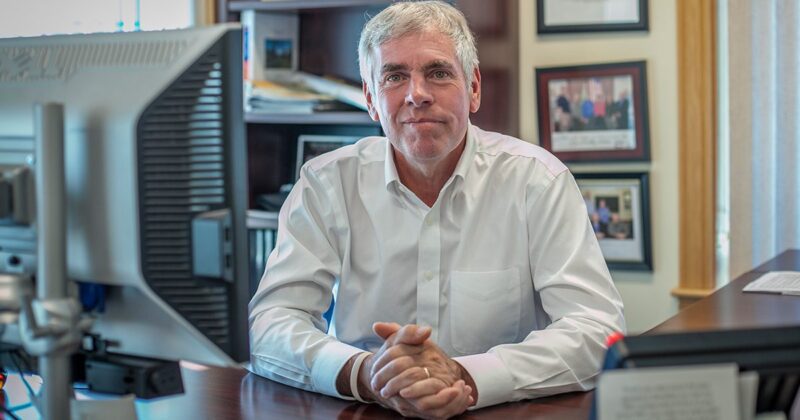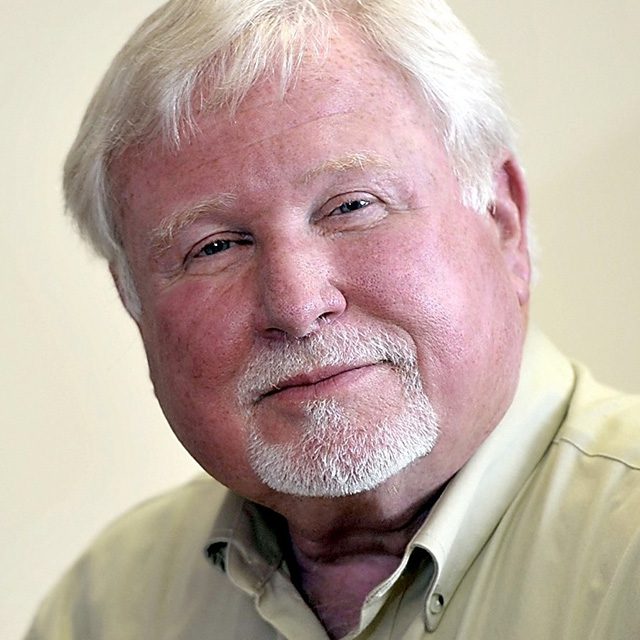Something was bothering Shawn Moody halfway through an hour-long interview. So he flipped the discourse and asked a question of his own.
He wants to be Maine’s next governor. His reputation as a successful businessman and novice politician speaks to sincerity and honesty. He seems like this century’s Jimmy Stewart starring in a new interpretation of the beloved movie, “Mr. Smith Goes to Washington.”
Except Mr. Moody wants to go to Augusta.
He is a former independent who went up against Democrat Libby Mitchell and Republican Paul LePage, making his first bid to become Maine’s governor, in the 2010 election. In a field of five candidates, including independent Elliot Cutler, Moody got 5 percent of the vote.
Moody didn’t run when LePage was up for re-election. Wanting the resources of a bigger team this time around, Moody enrolled in 2017 as a Republican.
On a sunny morning in his campaign offices in Augusta – and across an alley from one of his Moody Collision Centers – he had something on his mind.
Why, he asked, do televised attack ads take his words out of context? Yes, he had said public schools were overfunded, answering a yes-or-no question posed by the moderator to wind up an early forum of gubernatorial candidates.
But Moody couldn’t settle for a simple yay or nay and mentioned the inefficiencies in how schools spend their funding. Later, he elaborated, saying too much money was going to administrators and not enough filtered down to teachers in classrooms.
It wasn’t an original or radical point. The premise of a bloated level of school administrators was discussed when John Baldacci was governor. A result was a small wave of consolidations forming some new school districts that helped reduce the ranks of administrators.
Moody believes more can be done. He was not advocating for larger class sizes and fewer teachers, for instance, to cut costs.
“Why did they do that,” asked Moody, who sounded genuinely hurt or unwilling to accept that taking words or thoughts out of context is part of the process of getting elected in today’s world.
RELATED: FIVE FIRST-TIME WOMEN CANDIDATES VIE FOR SEATS IN THE MAINE LEGISLATURE
Moody spent much of his life building his own businesses in automotive repair, recycling auto parts and fixing crumpled vehicles in the string of collision body shops that bear his name. Businesses that lack glamour and rely on the personal reputation of the name on the building.
Moody is like the friendly local automotive mechanic or body shop owner who car owners wish they knew, more interested in making a broken vehicle whole again and winning a return customer.
How that qualifies Moody to be the next governor of Maine is another matter. He’s trying to succeed LePage. Moody says he wants to further LePage’s agenda, particularly as a fiscal conservative. Lauren LePage, daughter of the governor, is Moody’s campaign manager. A few others who have worked for the governor signed up as well.
Would Moody, the political novice who has never held an elected position in government, be easily manipulated?
“Shawn is nobody’s puppet,” contends Demetria Chadbourne, who first knew Moody when she was a young teacher and he was a student at Gorham High School. “If somebody tries to get by him that’s against what he truly believes well, good luck with that. He has great intuition.”
Chadbourne barely knew Moody in school. “School wasn’t his thing. He was the kid who got early release so he could go to work. He’d slip out the back door at 1 so he could work until 10.”
Chadbourne left teaching decades ago to start her own real estate business in Gorham. She got to know Moody during casual interactions through their businesses and by listening to the men and women who worked for his growing chain of collision body shops and came to her business to buy new homes. And more recently, she served with him on a Gorham committee.
What Chadbourne and her associates experienced ran counter to an Oct. 12 story in The New York Times, which focused on a 2006 complaint to the Maine Human Rights Commission alleging that Moody fired the complainant after she gave birth to her son.
A financial settlement was reached that included a non-disclosure agreement and the complaint was withdrawn. The woman recently went public with details of the 2006 complaint and settlement. Moody denied the allegations then and now, saying any employee terminated was because of performance issues.
He cites the NDA, questions the timing of a 12-year-old settled complaint resurfacing now and hasn’t talked about its details. Moody did not respond to interview questions about his personal reaction to The Times’ story.
“We were on a committee together of business people in Gorham and educators to help kids who were getting left out,” Chadbourne says. “Nobody worked harder than Shawn. I think he was the most passionate among us, the most generous. He was tireless.”
That’s why Chadbourne wrote a letter to the editor in the Portland Press Herald that was posted Oct. 18, refuting the message in the attack ads.
Don’t, cautions Chadbourne, underestimate the depth of Moody’s intelligence and compassion.
In his now-familiar story, Moody was all of 12 when he was left to fend for himself, alone, in the family home in Gorham for about a month.
RELATED: A LOOK AT ALL 186 LEGISLATIVE SEATS UP FOR GRABS ON NOV. 6
His parents divorced when he was about a year old and his father had moved out of state. Financial support wasn’t an issue, but his mother’s mental health was. Eventually, she was admitted to the Augusta Mental Health Institute, where she received electroshock treatments and Thorazine, a medication used to treat mental or mood disorders.
Moody’s older brother by eight years was living on his own. A sister was an exchange student in Norway. Amid the turmoil of his mother’s mental health, the adults in Moody’s life overlooked that he would be alone. And the 12-year-old Moody didn’t speak up.
“I didn’t want someone to take me away,” Moody said. “I was more worried about my mother. I loved her, and she was incapacitated.”
If people cite his compassion, Moody says that began then, when his world was turned upside down through no fault of his own. His understanding of compassion became more defined when teachers and administrators in the Gorham school system, along with extended family and friends, stepped up to guide and encourage.
“He figures things out,” says John Clark of Farmingdale, who also started out repairing vehicles before building a growing business of four scrap yards in Central Maine. Moody once contracted with Clark to flatten about 1,000 junked cars in Gorham. The two are well acquainted.
In the past, Clark has put on a new shirt, combed his hair, and gone to the Statehouse to speak at Legislature hearings on Maine scrap yards and the environment. He understands that people might misjudge him based on his business.
“I don’t really care,” Clark says. “I’m not running for office. Shawn is. Why wouldn’t you vote for him based on what he’s accomplished?”
Moody believes his accomplishments come through teamwork and his own instincts or beliefs. He was more interested in working in the bay of his very first automotive repair shop than sitting in a classroom. But with the support from his high school principal, Mark Eastman, Moody understood that school would open the door to most things in his life.
During an hour-long conversation in the office of his campaign headquarters in Augusta, Moody used the word ‘collaborate’ several times. “I see myself as a conductor. I have the desire to work with people, not just going along. I want to create a vision to find solutions.”
Moody, 58, was too young to understand he was doing exactly that when he was not yet a teenager and the wheels were coming off his life. “I was too concerned about my mother to think about anything else.”
He learned from his life’s lessons, bouncing back to his feet when knocked down. The 5 percent of the votes he received in the 2010 gubernatorial election was just another lesson: He would learn how to do better.
Q&A with Shawn Moody
Other than family and business, what’s another passion in your life?
Shawn Moody: Flying (amateur-built) experimental aircraft. I’ve had my pilot’s license for a while. It’s so relaxing to get up in the air. I love to fly, but I haven’t lately. I don’t know when I’ll be able to go up again.
With your interest in everything automotive, who’s your favorite NASCAR driver?
Moody: It was Harry Gant. Handsome Harry. Did you know he was a pretty good carpenter? He built houses when he wasn’t racing. (Gant last raced in the 1990s as the Skoal Bandit. Maine’s Ricky Craven succeeded him in that car, sponsored by U.S. Tobacco.)
Why were you able to succeed?
Moody: I always look ahead because your windshield is pretty big. Your rear-view window is pretty small. I wasn’t a good student (in high school), but Mark Eastman, the principal, kept encouraging me.
One of the things I’ve never forgot is, ‘I don’t care how much you know; I do want to know how much you care.’ Care is my four-letter word.
How do you get things done?
Moody: Leadership is creating a vision and having that desire to work with people, not just have them go along with you. When I joined the board (University of Maine System Board of Trustees, appointed by LePage), the University of Southern Maine and its faculty hadn’t negotiated a contract, there was a $16 million deficit and the faculty just had a vote of no confidence.
We sat with the faculty, negotiated, and people said we’d give away the farm. We didn’t, and we’ve kept the cost of education flat.




